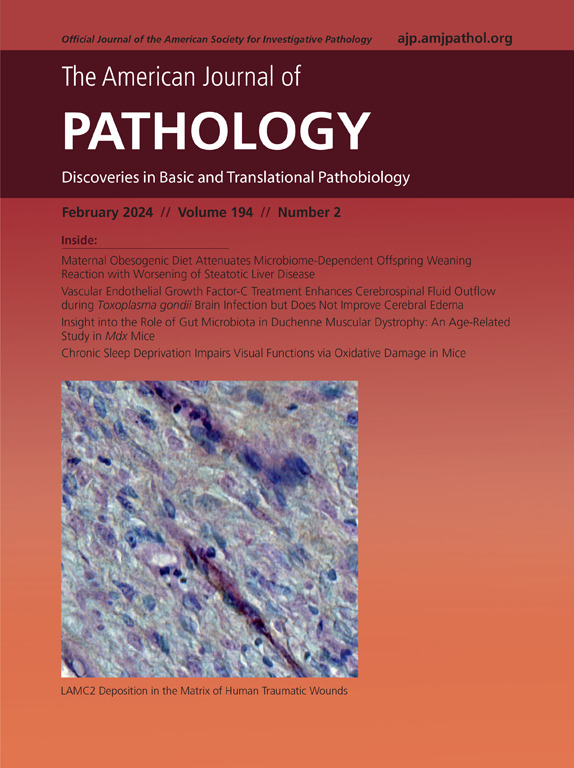Lipopolysaccharide Triggers Luminal Acidification to Promote Defense Against Bacterial Infection in Vaginal Epithelium
IF 4.7
2区 医学
Q1 PATHOLOGY
引用次数: 0
Abstract
The vaginal epithelium plays pivotal roles in host defense against pathogen invasion, contributing to the maintenance of an acidic microenvironment within the vaginal lumen through the activity of acid-base transport proteins. However, the precise defense mechanisms of the vaginal epithelium after a bacterial infection remain incompletely understood. This study showed that bacterial lipopolysaccharide (LPS) potentiated net proton efflux by up-regulating the expression of Na+-H+ exchanger 1 (NHE1) in vaginal epithelial cells. Pharmacologic inhibition or genetic knockdown of Toll-like receptor-4 and the extracellular signal–regulated protein kinase signaling pathway effectively counteracted the up-regulation of NHE1 and the enhanced proton efflux triggered by LPS in vaginal epithelial cells. In vivo studies revealed that LPS administration led to luminal acidification through the up-regulation of NHE1 expression in the rat vagina. Moreover, inhibition of NHE exhibited an impaired defense against acute bacterial infection in the rat vagina. These findings collectively indicate the active involvement of vaginal epithelial cells in facilitating luminal acidification during acute bacterial infection, offering potential insights into the treatment of bacterial vaginosis.
脂多糖引发腔内酸化,促进阴道上皮对细菌感染的防御。
阴道上皮在宿主抵御病原体入侵的过程中发挥着关键作用,它通过酸碱转运蛋白的活性来维持阴道腔内的酸性微环境。然而,人们对细菌感染后阴道上皮所采用的精确防御机制仍不甚了解。本研究表明,细菌脂多糖(LPS)通过上调 Na+-H+ 交换子 1(NHE1)的表达来增强净质子外流,而不影响阴道上皮细胞中的其他酸碱转运蛋白。药理抑制或基因敲除 Toll 样受体-4(TLR4)和细胞外信号调节蛋白激酶(ERK)信号通路可有效抵消 LPS 在阴道上皮细胞中引发的 NHE1 上调和质子外流增强。体内研究显示,LPS 通过上调大鼠阴道中 NHE1 的表达导致管腔酸化。此外,抑制 NHE 会削弱大鼠阴道对急性细菌感染的防御能力。这些发现共同表明,阴道上皮细胞在急性细菌感染期间积极参与促进管腔酸化,为治疗细菌性阴道病提供了潜在的启示。
本文章由计算机程序翻译,如有差异,请以英文原文为准。
求助全文
约1分钟内获得全文
求助全文
来源期刊
CiteScore
11.40
自引率
0.00%
发文量
178
审稿时长
30 days
期刊介绍:
The American Journal of Pathology, official journal of the American Society for Investigative Pathology, published by Elsevier, Inc., seeks high-quality original research reports, reviews, and commentaries related to the molecular and cellular basis of disease. The editors will consider basic, translational, and clinical investigations that directly address mechanisms of pathogenesis or provide a foundation for future mechanistic inquiries. Examples of such foundational investigations include data mining, identification of biomarkers, molecular pathology, and discovery research. Foundational studies that incorporate deep learning and artificial intelligence are also welcome. High priority is given to studies of human disease and relevant experimental models using molecular, cellular, and organismal approaches.

 求助内容:
求助内容: 应助结果提醒方式:
应助结果提醒方式:


